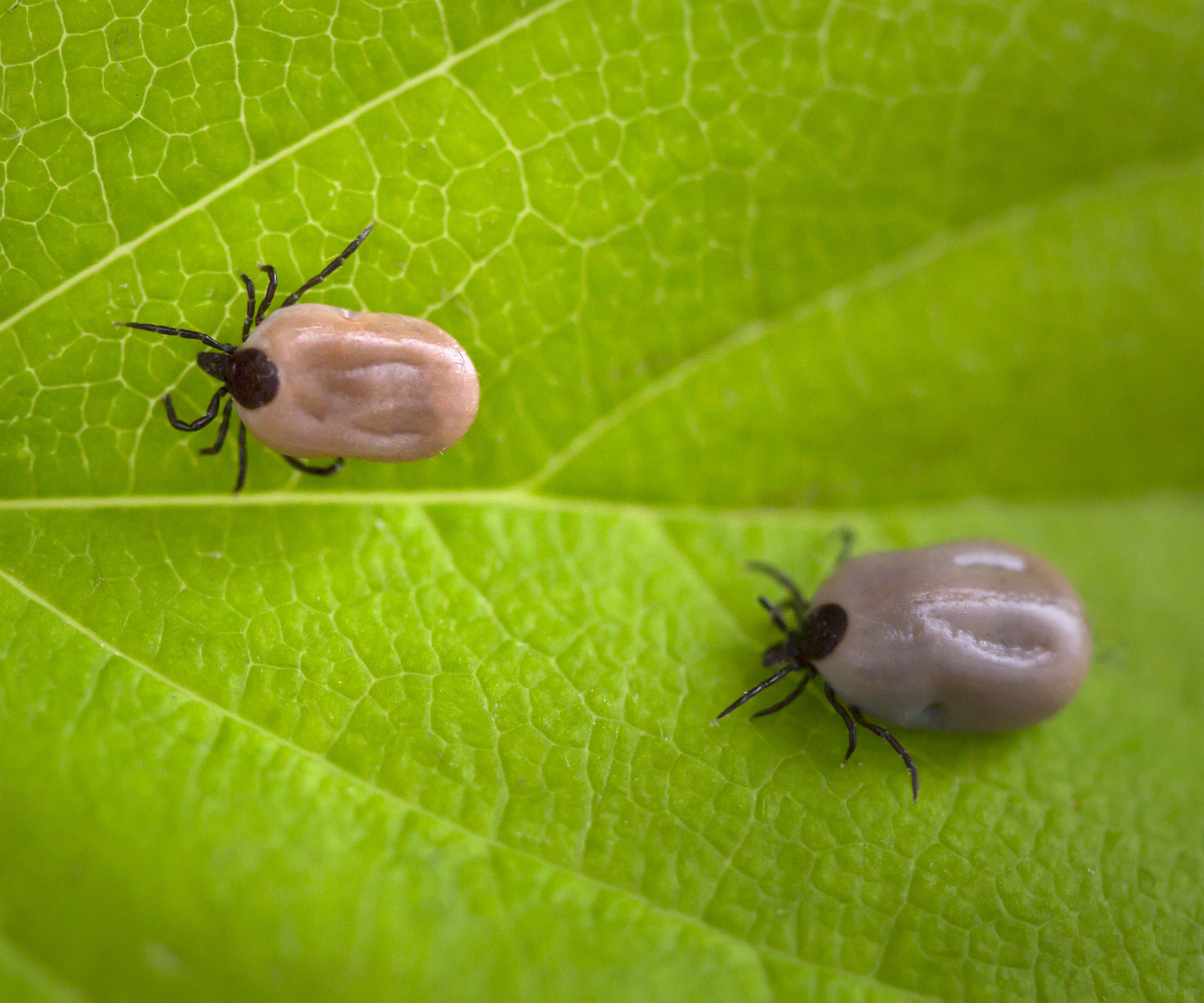
Ticks are unwelcome visitors to any backyard. The tiny creatures spread nasty diseases that can seriously harm your health, and that of your family or pets.
Most people may think ticks are restricted to woodlands or overgrown spaces. However, ticks can enter backyards attached to wildlife and settle into unmown or wilder areas. They will even migrate into lawns.
They multiply quickly so you need to know how to kill ticks in your yard. When they become active on a lawn it poses a risk to children playing on the grass or the family pets. Here, lawn care and pest control experts share five ways to prevent and get rid of ticks on lawns.

5 ways to control ticks on lawns
The following five measures include a mix of pre-emptive tactics to mitigate the risks of ticks in a yard and control measures to implement in the case of an outbreak of ticks.
1. Keep the lawn short

‘The top prevention step I recommend is keeping your lawn regularly mowed,’ says Ryan Farley, CEO of LawnStarter. 'Ticks prefer tall, dense brush and grass, so keeping your grass at a reasonable height will mean ticks naturally avoid the area.’
Regularly mowing a lawn is the simplest way to prevent ticks on lawns. Start mowing the lawn in spring and aim to keep the grass less than three inches tall to make it less attractive to ticks. Also, remove fallen leaves and other plant debris from the lawn and use these, along with your grass clippings, to make compost.
2. Create a barrier around the lawn

A sound way to prevent ticks on lawns is to create an uninviting perimeter to stop them from venturing into the grass. It can start with using a backyard fence or deer-resistant plants to prevent tick-carrying animals from accessing your yard.
‘It can also be helpful to separate dense areas of your landscaping from your lawn using mulch, woodchips, or hardscaping elements like paths, rocks, or gravel,’ adds Ryan Farley. Ticks don’t enjoy walking over such jagged material so such a barrier stops ticks that may be in borders or wilder areas of the yard from relocating onto the lawn.
3. Use diatomaceous earth

If you would rather use natural pest control methods rather than chemicals, one is to use diatomaceous earth to deal with ticks on lawns. ‘I love this stuff as a solution for lots of different pests,’ says Ryan Farley. ‘It’s effective at killing and deterring them but is safe to sprinkle in your grass and on your soil. It’s also safe for use around pets and kids.’
Diatomaceous earth is a fine, powdered natural substance that is a non-toxic way to deal with many backyard pests, including tackling aphids, slugs, snails, ants, roaches, ticks, and more. Ticks will become severely dehydrated after contact with diatomaceous earth and die hours later. The product is best applied every two months during the tick’s active season and reapplied after heavy rainfall, as it loses its effectiveness once soaked.
A 4lb bag of granular food-grade diatomaceous earth that can be used as a natural insecticide around a back yard.
4. Introduce natural predators

Lorne Hanewich from Clark's Termite & Pest Control, which offers pest control services across the Carolinas, recommends introducing natural predators to control an invasion of ticks on lawns. Lorne says: ‘Consider encouraging tick-eating wildlife like certain birds or applying beneficial nematodes to target ticks.’
Birds, chickens, guinea fowl, frogs, squirrels, opossums, and ants are natural predators of ticks. Creating a wildlife garden can attract beneficial predators and having free-range chickens will suppress ticks as the flock snacks on them. Keeping chickens and having a green and thick lawn do not necessarily go hand-in-hand, but they eat lawn pests and weeds and help aerate a lawn.
Nematodes offer a biological form of pest control to target and kill ticks. They can be used whenever the soil temperature exceeds 40ºF and predominantly target adult female ticks.
5. Spray the lawn

Pesticides designed for tick control are available if you have a problematic infestation of ticks on lawns. For example, a permethrin spray is an effective control for ticks on lawns. Any chemical control must always be applied according to the manufacturer's instructions while wearing a mask and protective clothing.
Pesticides should be the last measure as they can damage the natural ecosystem. Chrissie Handley from Online Turf recommends trying to ‘tackle them sustainably’ instead by making DIY tick repellent.
‘To treat a current tick infestation, you may want to try some homemade oil sprays such as coconut oil or citronella oil,’ says the lawn expert. ‘Dilute the oil with water into a spray bottle and apply to tick-populated areas. The strong and potent smell should deter ticks and other unwanted pests like aphids and mosquitoes.’
Other examples of homemade bug sprays that can deter or kill ticks on lawns include ones made with eucalyptus oil, cedar oil, or neem oil.
Shop natural repellents for ticks on lawns
A natural spray made from cedarwood oil that kills and repels a wide range of insects, including ticks, mosquitoes, and fleas. It is safe for children and pets.
A ready-to-use spray made from neem oil that is certified for organic gardening and works against many pests and diseases.
Citronella essential oil you can dilute with water to make a citronella essential oil spray to deter ticks thanks to its strong smell.
FAQs
Does mowing the lawn kill ticks?
Mowing the lawn and keeping it short actively discourages ticks, as the pests prefer to reside in longer grass. Mowing at least once a week when the grass is growing keeps the grass short and less inviting as a habitat for ticks.
Take when watering grass to avoid potential tick issues. The pests prefer moist grass and overwatering a lawn creates a more inviting environment for ticks.
When gauging how long you need to water a lawn, it is better to water deeply and infrequently than little and often. Lawns need around 1-1.5 inches of water per week, from rainfall or backyard irrigation, and using a soil moisture meter, available at Amazon, can help you make informed decisions about how often to water the lawn.
This will help avoid overwatering and risking creating a more appealing destination for ticks.







